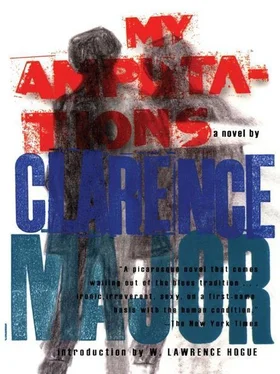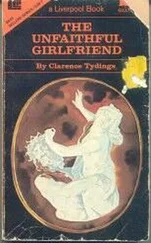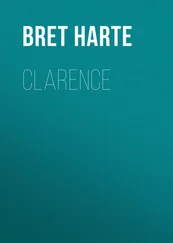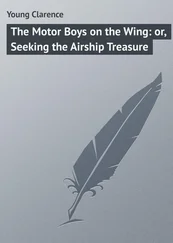Clarence Major - My Amputations
Здесь есть возможность читать онлайн «Clarence Major - My Amputations» весь текст электронной книги совершенно бесплатно (целиком полную версию без сокращений). В некоторых случаях можно слушать аудио, скачать через торрент в формате fb2 и присутствует краткое содержание. Год выпуска: 2008, Издательство: Fiction Collective 2, Жанр: Современная проза, на английском языке. Описание произведения, (предисловие) а так же отзывы посетителей доступны на портале библиотеки ЛибКат.
- Название:My Amputations
- Автор:
- Издательство:Fiction Collective 2
- Жанр:
- Год:2008
- ISBN:нет данных
- Рейтинг книги:5 / 5. Голосов: 1
-
Избранное:Добавить в избранное
- Отзывы:
-
Ваша оценка:
- 100
- 1
- 2
- 3
- 4
- 5
My Amputations: краткое содержание, описание и аннотация
Предлагаем к чтению аннотацию, описание, краткое содержание или предисловие (зависит от того, что написал сам автор книги «My Amputations»). Если вы не нашли необходимую информацию о книге — напишите в комментариях, мы постараемся отыскать её.
My Amputations — читать онлайн бесплатно полную книгу (весь текст) целиком
Ниже представлен текст книги, разбитый по страницам. Система сохранения места последней прочитанной страницы, позволяет с удобством читать онлайн бесплатно книгу «My Amputations», без необходимости каждый раз заново искать на чём Вы остановились. Поставьте закладку, и сможете в любой момент перейти на страницу, на которой закончили чтение.
Интервал:
Закладка:
Night. In the sitting room they were delighted when Mason appeared. He looked great in his tux! He'd brought down with him an armful of things he forgot he had: gifts from Painted Turtle: a few porcupine quills, a beaded necklace, a rawhide vest, a sacred headdress, some smoked meat. Having found these items in his suitcase, he now presented them to his hosts. “Just a little token of my appreciation of your hospitality!” They all ooed and laughed nervously. His stomach ache was now joined by a killer-headache. As they fussed over the gifts, he dropped onto the couch like a sack of frostbitten sweet potatoes! “Quick!” somebody shouted, “he's ill!” When he came back to consciousness — an hour later? — it was time for the outdoor events. On the way out, through his fog he heard, “What shall we call you?” “Just call me Mister Nobody!” Odysseus? They laughed. He laughed and slapped their backs with the gentleness of pink and green in the Equestrienne of 1931. Rock-cut benches lined the yard. Mason clicked his champagne glass against other precious glass. Many of the women — some he hadn't seen before — wore long white or yellow off-the-shoulder hooped evening gowns. Little children hid under some of them. Dogs under others. Perhaps snakes? doctors? A couple held above their heads an unneeded parasol. A horse-drawn carriage waited in the driveway. Necklaces and bracelets and rings glittered all over the place. The night smelled of snake-skin and mossy wood, of vaporous flowers and Nijinsky's socks, of white lilac! Mason heard banjo music. A small group of musicians under a tree were doing their best to carve tones of hillbilly refinement. A couple of piglets turned on spits over a bricked-in fire under moonlight. Dining tables were arranged in rows. Mason sipped his champagne in the hope that it would turn him into a prancing antelope. He had plans for this night: for him it was like being a personified ship entering a narrow passage formed by two blissful, nameless islands covered with white ash and volcanic lava. His expectations were high! Some of the guests were beginning to dance under the lights: patriarchs and ladies! Pavlos like some figure rising naked from the sea, cutting a jig on the rough black grass! Where'd all the kids come from? Brats all over the place — boxing, pissing, giggling, rolling in the music. Pavlos stopped and came to Mason. “Won't you dance?” “With you? Why not?” And as their heels dug new scars into the faces of gods and demons long in the dust, Pavlos told him how last month they'd done eighteenth-century Russia. Helena then interrupted, “Now, now, tut tut: two men dancing together! You come to me, Mister Bobby Joe Sommerfield! I'm yo little ol sweety pie, Miss Lindy Belle.” Her accent was so funny Mason fell to the ground in uncontrollable laughter. But his perplexity was still safely at arm's length: veni vidi vici! vogue la galere! tout comprendre c'est tout pardonner! truditur dies die! The pungent smell of pig whirled as Mason later danced with Helena, then some other woman. Mister Nobody stomped the grass till half the lights burned out. Sunlight was winking through the branches of evergreen when he realized he was already asleep though still moving. But how'd he get moccasins on his feet? He'd surely started out with black dress shoes!
… Where? This stuff on his face. The woman next to him? Black smudges on her cheeks. He rested his head and reconstructed. Yes. Something — not long ago — had hit him like a brick between the eyes: he'd awakened and saw a woman in bed next to him. On each shoulder blade there was about a thirteen inch oblong scar: as though powerful wings had long ago been severed from her. He refused to connect this to anything. She was still asleep: that breathing was unfakable. Elias had fallen in the duck pond. Laughter. Except by then he was Jed the Red Neck. Mariella turned out to be Rebecca of Jacksonville who was a virgin at thirty. Helena, as Miss Lindy Belle, got pretty vulgar after midnight: she danced nude in moonlight. Pangrati, insisting his name was Big Papa, eventually did a jig. He also played “Skip to My Lou” on his harmonica. The musicians grew weary and after grinding their way through “So Long It's Been Good to Know You,” six times, they gave up and went off. He'd fallen asleep with a jingle swinging in his nerves: “Railroad, steamboat,/ River and canoe;/ Lost my true love,/ What shall I do.” And the dream: a snatch of it: strange how one was sort of native yet not exactly in the vernacular. Verna, ho! Had somebody played a washboard. Was it Hagnon, I mean, Sonny Boy. Surely a hooped skirt lost its cloth and the huge puffy bloomers beneath the wire-ribs seemed to blossom like a giant night flower. Who was Baby Jane. Pretty face — but she'd come later. Real name he never caught. No matter. Susy Mae. Mary Alice. Bo. Big Boy. All masks for Achilles. Phoibos. Zeus. Meidias. Lysias. Dionysos. Despite the unrealness he had to admit they had real imagination. And he as Blackface Hermes (as Zizi called him at the end of dinner with a toast) was up and all along cheered. One woman very much out of place (who he later learned was Vietnamese) came to the fancy dress party wearing a serious oriental mask: it was antelope skin meant to look like human. Her black hair hung to her spine. She was terrifying: the tiny eyes peeked through the slits like rat eyes: desperate and on the run. Wasn't it Pavlos who'd said her real face was completely destroyed by the explosion of a booby-trap. Or was she a figment in or beyond a recent dream. But the woman now beside him? Zizi. Moonlight and memory: no help now. One thing was clear though: he was not just drifting: the design was terrifying in its connections.
The Larissa interlude was lost and worthless — he was now in Kalambaka at the Divani and it was morning. Meeting those two mountain climbers, Seymour (with his pot gut and Slavonic-thunder-god face) and William (a classic Centaur) last night at Cafe Zeus was a lucky break. Mason trusted the calmness of their eyes. Seymour, drunk by ten, sang Leadbelly: “Green corn, come along Cholly!” He was good. Feeling chipper, Mason gave him a voodoo warning, “You sprinkle goofy dust around my bed/ You might wake up and find your own self dead.” The point: in the morning (this one) they were going to climb to the untouched, secret cave of an ancient monk called Hecrate, Knower of All Truth. Legend had it he'd left (in some form other than writing) a “text” which addressed itself to the problems of the soul's relationship to the body and the body's to the group of other bodies beyond itself. Mason was not getting his hopes up but he was damned sure interested…. (Late yesterday, on arriving in Kalambaka, he'd followed his nose and driven up a road through the Meteora Rocks because those ancient hermits might've held part of the question if not the answer. He parked near Varlaam Monastery: a giant eagle's nest perched at the top of a peak. On a swing-bridge a group of German tourists were being conned by a Hindu maker-of-little-wood-images of Ereshkigal. Mason looked up through the monastic aura and saw, from the embankment, a delivery man loading a satchel of goods for the monks. He watched the guy wheel it over on a pully. The bundle reached a tiny opened window. Hands jutted out but rather than capturing the supplies upset them: meat and milk, eggs and bread, turned into birds with broken wings. Mason uncrossed himself and moved on, deciding against entry. At nearby Monastery Hagios Stephanos he cornered a nun and told her his name. She said, “So?” He whispered, “Be in love and you will be happy. Be mysterious.” He knew she was wise to him when she responded: “You are a relief in bad wood: esoteric, sarcastic. Go cast yourself in Tamanu. ” Three alarmed nuns approached them and stopped a few feet away. Carpenters in the background were hammering on the facade of a nun's dwelling. He turned and ran. Driving down: no time for sentimental reflection. All experience was a smooth swift surface. Really? The fourteenth century couldn't be trusted! He was sure now there was no difference between the Garden of Eden and Hell. After a few drinks down in the town he sped back up and parked on the road near Monastery of Metamorphosis. The dusk-sky was a traffic jam of old cars with their headlights on. Mason didn't expect the real Transfiguration. Nor any help from the monks. But he was surprised! He was led to the Charnel House of skulls and thigh bones. The guard told him to take his time. Once the door was closed, Mason sat on the floor and picked up a dusty skull. He placed his ear to the thing. It spoke: “Do not eat of the turpentine tree.” He put it down and took up another. It too spoke: “Do not trust the cult of the gods.” He lifted yet another to his ear. Its message: “Father Divine is the supplier and satisfier of every good desire.” After listening to eighty-eight cryptic messages similar to the first three, Mason gave up. On the way out he left a donation of a hundred bucks. From there, he stumbled on through farther gloom to baroque icons. He tried to kiss them through the glass, he placed his ear to the cases: nothing! In the museum a shabby man who said he was from Phigaleia wouldn't leave Mason alone. He kept explaining Truth and Reality. According to him both had been documented in the ninth and twelfth and thirteenth and fourteenth centuries. Mason finally gave in. “But what about transfiguration ?” A group of tourists came in with a guide and scattered the man's response. The guide said, “The manuscripts in this room were restored after the war with money from the Magnan-Rockford Foundation in America.”)
Читать дальшеИнтервал:
Закладка:
Похожие книги на «My Amputations»
Представляем Вашему вниманию похожие книги на «My Amputations» списком для выбора. Мы отобрали схожую по названию и смыслу литературу в надежде предоставить читателям больше вариантов отыскать новые, интересные, ещё непрочитанные произведения.
Обсуждение, отзывы о книге «My Amputations» и просто собственные мнения читателей. Оставьте ваши комментарии, напишите, что Вы думаете о произведении, его смысле или главных героях. Укажите что конкретно понравилось, а что нет, и почему Вы так считаете.












